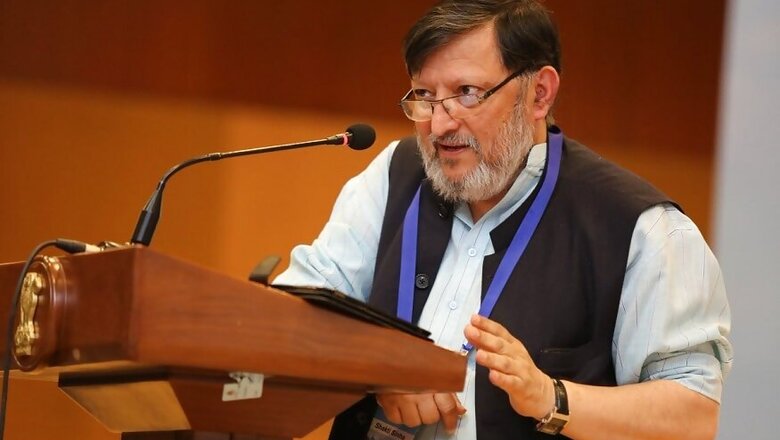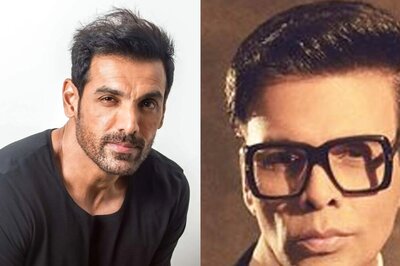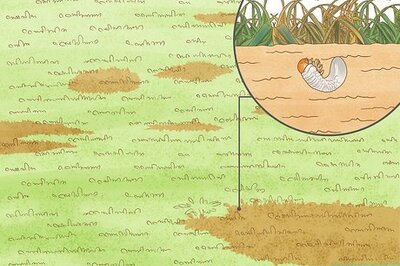
views
The coronavirus crisis has forced many countries to reconsider doing business with China, and India has taken a significant first step by mandating prior approval from the central government for any investments.
Although the new FDI rules do not name China specifically, Shakti Sinha, who was Atal Bihari Vajpayee’s private secretary and joint secretary in the PMO from 1996 to 1999, says the restrictions clearly reflect the mood in New Delhi: “with China, economics cannot be kept separate from politics.”
Speaking to News18, Sinha, a former director of Nehru Memorial Museum & Library, said that while China will remain an important supplier of machinery, India needs to cut down on dependency in key sectors like pharmaceuticals, fintech and e-commerce as the next step and deepen ties with ASEAN and European countries like France and Germany.
Here is the full conversation:
Q. The world as we know is changing as it battles Covid-19. There is increasing unification of global powers against Chinese hegemony on global production. There is a sense that China is a ruthless nation without democracy or free speech, and we will never know the true story behind the spread of Coronavirus. Conspiracy theories aside, where do you see China in world order in months and years to come? And how do you think China is going to react?
A: There is a reasonably clear understanding that no country can be the factory of the world. China is so deeply enmeshed in global supply chains, and in fact, it is the cog that keeps the system running. Unfortunately, this also means that if China holds back, or is held back by natural calamities or external disruptions like a war, it would bring the world to a halt.
Unfortunately, this time the Chinese leadership has been found wanting because they suppressed the news about Coronavirus, its impact and spread. More so that human to human transmission had started. Worse, they cynically manipulated the WHO into misleading the world. Governments and societies around the world have interpreted this as an act of bad faith and China’s reputation and reliability has taken a hit.
But as much as people want to shift manufacturing out of China, it is not so easy to do. It is time consuming and expensive. So economically, China will remain the hub of the international system. Politically, there would be pushbacks against China, as it has already started happening. China on its part has launched a massive disinformation campaign to ‘rectify’ its image and this is likely to become more aggressive.
Q. India’s policy towards China for the past two-three decades has been that of working closely on economic issues while putting differences, particularly those related to boundary conflicts, aside for a later date. Two days ago, India made government approval mandatory for any Chinese investment to come to India. One can’t see this as a purely economic move, particularly at a time when global pushback is happening against China. How do you read it?
A: As I said above, this is part of the pushback against China. In fact, India has been hedging its political bets also in the light of aggressive Chinese moves, like its support to Pakistan by protecting terrorists from being put on the UN sanctions list. This India has done by its participation in the Quad process, making Japan a permanent participant in the Malabar exercises. The FDI restrictions makes it clear that with China, economics cannot be kept separate from politics.
Q. Are we seeing the beginning of a new era in India-China relations? What lessons from the past do we need to keep in mind while forming a new China policy?
A: China will remain an important supplier to India of machinery, including in power generation, chemicals (such as API for pharmaceuticals) etc. Chinese firms in India are the dominant supplier of mobile phones (80 per cent plus), our digital payment system (Paytm), e-commerce, as well as funders of our start-ups. India will have to think hard on how to lessen our dependencies on key sectors, e.g. pharmaceuticals, Fintech and ecommerce, without jeopardising our own economy.
India would need to deepen its engagement with ASEAN as well as work with greater vigour with France, Germany and Australia to help shape a global and regional agenda that sustains the international order. These engagements would include political, economic and strategic. This would help keep these dialogues out of big power politics and help generate alternative ideas that have purchase across the globe.
Q. Is it good for India to move away from a balance between US and China diplomatic relations, towards a more pro-America foreign policy? What are strategic benefits of such a major shift? Are there any potential risks?
A: India and the US have more convergence in their interests than before, and a lot of that has to do with China’s aggressive and expansionist actions. In that sense, it is China that has pushed India to move closer to the US. China’s frequent efforts to have the Security Council discuss the Kashmir issue, their moves in India’s neighbours, as well as on trade matters where behind-the-border barriers prevent Indian exporters from selling in the Chinese markets.
China has changed its international posture very considerably over the past decade or so. It has shed its inhibitions: Deng’s advice to hide its capabilities and keep a low profile have been shed. China now wants others to follow its lead, it does not want equal partners. Risks in coming closer to the US are limited in that we are not entering into any security alliance. But it would be more risky if we are all on our own.
Q. Many believe that India will benefit from an anti-China movement in the developed world. All G-7 countries have used harsh language against China, saying they will not be going back to business as usual once a vaccine is developed. But how fair is it to assume that India is an obvious and favoured alternative to China?
A: Nothing should be assumed. India would have work to improve the climate in which investors would bring in investment into India. This may involve improving the taxation and regulatory regimes, improve educational capabilities so that a trained work-force is available and bridge infrastructural gaps.
Q. Former PM Vajpayee once said that friends can be changed but not neighbours. How do you compare Modi government’s policies towards China with Vajpayee’s? Where do the differences and similarities lie?
A: Both Vajpayee and Modi have more or less the same approach - engage with China, try and widen areas of agreement but be clear that China poses a strategic challenge to India. So remain polite and firm. Times have changed so these two Prime Ministers faced different challenges - internal, regional and international. So one should not jump and make comparisons without analysing these circumstances.
Q. Ever since COVID-19 crisis broke out, PM Modi has been speaking to world leaders on a regular basis. Even as the virus forced governments to become protectionists, Modi reached out to the worst-affected countries and supplied them hydroxychloroquine, and he also called for SAARC and G-20 meetings over video conferencing. This was when none of world’s most powerful leaders — Xi, Trump, Putin, Macron, Johnson — was ready to take on a role bigger. How has Modi performed? Do you think it has boosted his global stature and India will benefit from it?
A: These steps would need to be complimented with developing alternative agendas and ideas, as elaborated above. Two, strengthen the Quad to ensure that the region is peaceful and not hostage to any one country’s unilateral actions. Three, get India’s economy growing, and growing fast. An economically strong India coupled with the political achievements of Prime Minister Modi would help strengthen India’s international position.
Q. The role of World Health Organization is being seen with greater scrutiny. In dealing with the pandemic, is it toeing the line dictated by China? US President Donald Trump accused the world body of not holding China accountable.
A: The WHO has regrettably damaged its reputation by misleading the world. When countries rightly started restricting and then shutting down international travel, the WHO actually criticised them. That was irresponsible. Had the WHO played the role that it was supposed to, the pandemic would have lesser impact
Q. How do you assess the way the Indian government has handled the Covid-19 crisis at home? While it implemented the world’s biggest lockdown, there are questions over lack of testing and PPE kits for safety of medical staff. What are your views on this issue?
A. India has been one of the countries who has handled the pandemic well. I can think of South Korea and Taiwan as most effective. If you look at the numbers of tests carried by India, the numbers who test positive and the numbers of fatalities, then the figures are consistent. So we have not been found wanting. The best part is that the Union government and the state governments (other than West Bengal) have worked well jointly. Could the state governments have handled the movement of migrant labour better? Yes, absolutely but the numbers involved was huge and unprecedented.
The same holds true of feeding also. Rumour mongering should also have been nipped in the bud. The health system has risen to the occasion despite their limitations in terms of resources. Health is a state subject and clearly hospitals should be better resourced in terms of PPE, ventilators etc. but till date, the corona load has not put the system on strain.
Q. How do you read PM Modi’s tasks like clapping and beating thali to thank ‘Corona Warriors’ and lighting of diyas as a mark of solidarity? Some observers saw a touch of soft Hindutva in these tasks?
A. If the criticism was to the fact that the symbols chosen reflected Indian cultural ethos, I can understand it, but attributing them to Hindutva is to drag in politics unnecessarily. In any case, no symbol can be such that everyone likes or agrees with. Mahatma Gandhi was ridiculed when he proposed his Dandi March; his colleagues including close ones asked whether making salt would overthrow the British Raj. Sadly, these critics did not, and do not, understand the psyche and ethos of the Indian people.
Q. In India, Covid-19 was given a communal colour, forcing the PM to post a tweet that the virus does not see race, religion or cast. This was three weeks after communal remarks were first made when some people attending the Tablighi congregation in Delhi were found positive. How do you see this particular incident?
A: The organisers obviously left their minds behind. Coronavirus had already reached Malaysia after the Chinese New Year and to get Tablighis from that country and others was wrong. Incidentally, all foreigners were violating their tourist visas by attending. Sadly, the Tablighis were then sent out to different parts of the country for Tabligh work.
The surge in coronavirus cases led people to question why the congregation was held. This, unfortunately, created conditions that people exploited. Times are charged - local people prevented a doctor each in Shillong and Chennai, who had died, from being buried. Having said that, communalising it was not right and the PM’s intervention was very useful and needed.
Q. OIC has taken a note of communalisation of Coronavirus in India and criticised it. At a time when Modi is making massive diplomatic outreach across the world, do you think this will hurt India’s image in Islamic countries?
A: There is a concerted effort to give a bad name to India internationally. PM Modi has worked hard and improved India’s relations with the Arab world, particularly Saudi Arabia and UAE. UAE even invited India to an OIC meeting (of foreign ministers). This has upset Pakistan, which even boycotted the OIC FM meeting. To now circulate Tejaswi Surya’s three years old FGM (Female Genital Mutilation) tweet confirms such anti-India campaign.
Q. One of the seven pledges PM wants every Indian to take is to follow AYUSH ministry’s guidelines on strengthening immunity via Ayurveda and other traditional medicines. There is no scientific proof that immunity-boosting traditional medicines can protect against Coronavirus. Some have accused government of pushing its ideological agenda in fight against Coronavirus?
A: How is promoting Ayurveda ideological? The PM’s push is to help holistic approach to heath that Ayurveda offers. It may not have a specific medicine for coronavirus but it is useful in helping build general immunity.



















Comments
0 comment